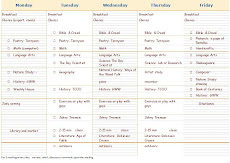I was looking at it today to see if it would offer an approach to a progym-like method that would rely considerably on talking rather than just writing. The book is meant for 4th to 6th graders, so I looked at the last third of the book.
Anyway, I wrote this sort of abstracted form of the first four lessons in the third section. I was thinking that if I took the "schema" and dropped the specific models, then I could fit my own models in there instead. One of the reasons I couldn't make the book work for me in the past was that it didn't seem very integrated with what we were actually doing.
Here it is:
-----------------------You get the picture -- one possibility would be to have the Nativity story for the lesson One model, then some Christmas poems for the second lesson. And so on.
Lesson One----------------------------------
- Read a story about someone worthy of admiration (or the contrary). For example, a parable or a legend.
- What lesson did the author intend to impart in the story?
- Read some lines that support this.
- What good qualities did the hero show? In what actions?
- What reactions did the other characters in the story have to the action?
- How did the antagonist react, and why?
- Write an outline of the story.
- Tell the story from the outline.
Lesson Two: Subject and Predicate
"The moon is very beautiful."
Explain subject and predicate.
Activity:
- Complete sentences, inventing a predicate to go with the subject.
- Complete sentences by inventing a subject for the written predicate.
(This could be an exercise drawn from the model in the first lesson, so it could be a bit like a form of narration; it is also a bit like cloze activities, which are usually used to help students read for meaning )
------------------------------------
Lesson Three:
Preparation:
- Select two poetic or literary passages, perhaps connected with the model in the first lessons.
Activity:--------------------------------------------
- Compare and contrast -- style, words chosen, and so on.
- Figure out some of the poetic or literary idioms in the passages
- Write a section from dictation, or copy a favorite part.
Lesson Four: Review
Analyze one of the models above for punctuation. Look for:
- exclamation points
- commas
- apostrophes
- quotation marks
- capitals
Discuss why they are used in this context.
Copy out a few sentences, or have a copy ready made.
- Underline the complete subject.
- Double-underline the complete predicate.



No comments:
Post a Comment